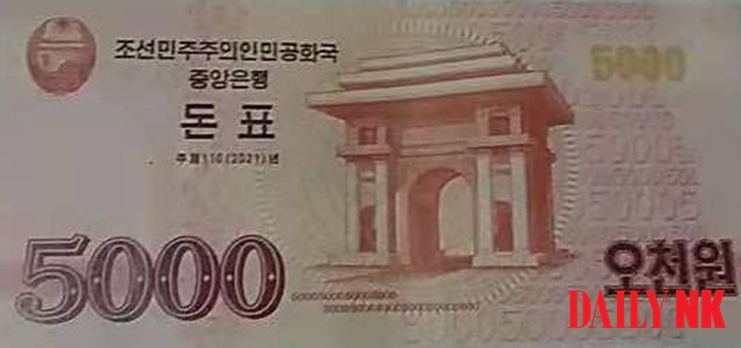North Korea is cracking down hard on people who refuse to accept money vouchers – donpyo – or who make illicit profits by undervaluing the vouchers. These people could face a maximum punishment of life in prison given they are being treated as political criminals who violated state measures.
According to multiple North Korean sources on Friday, North Korean authorities arrested and detained several money changers in major cities such as Pyongyang, Sinuiju and Chongjin between Dec. 9 and 11, accusing them of hindering the distribution of donpyo.
The accused money changers reportedly sold KPW 5,000 donpyo for less than their face value, and then used the vouchers to buy various imported goods, gasoline, and diesel fuel.
The clients of the money changers were also arrested, accused of “accepting without criticism” transactions that valued official state-issued currency less than “the US imperialists’ dollar.”
Daily NK previously reported that the authorities organized a “unified command to normalize the distribution of donpyo” to crack down on illegal behavior involving donpyo and improve the public’s image of the vouchers.
The command’s teams are reportedly going around markets to ensure the smooth distribution of the donpyo.
What is peculiar, however, is that when the teams discover illegalities, the culprits are arrested and detained not by the Ministry of Social Security — analogous to South Korea’s police — but by the country’s prosecutors.

In North Korea, prosecutors generally remain uninvolved in a crime’s investigation process, with the Ministry of Social Security usually exercising investigative authority. However, Daily NK understands that prosecutors are directly involving themselves in cases involving donpyo from the investigation stage.
When a money changer in a market in Pyongyang’s Sosong District was arrested last month for selling KPW 5,000 donpyo for just KPW 2,500, he was arrested by Ministry of Social Security agents. More recently, however, prosecutors’ offices have been getting directly involved from the investigation stage in similar cases.
One of the sources said this is because most of the money changers who have been arrested so far were found to have colluded with Ministry of Social Security personnel.
In fact, money changers often bribe Ministry of Social Security agents to reduce their sentences even if they are caught engaged in wrongdoing. North Korean authorities are apparently mobilizing the prosecutors rather than the Ministry of Social Security to crack down hard on the money changers, knowing full well the corruption taking place.
Given that the Central Public Prosecutors Office is getting directly involved in donpyo-related cases, money changers will find it difficult to reduce their sentences through bribes and connections.
North Koreans believe the money changers detained in the recent crackdown will receive life sentences or at least 15 years of forced labor.
The prosecutors’ offices have already conducted “public struggles,” public trials of a sort that gathered together about 100 people, including cadres from local people’s committees and other money changers. Because those managing these “struggle” sessions have said the accused committed crimes “deserving of life sentences,” the suspects likely face similar sentences during their actual trials.
One source told Daily NK that a sentence of 15 years or more is lighter than those handed out to “political criminals”; however, such long sentences still mean the accused are receiving punishment similar to those handed out to political criminals. He further claimed that the North Korean state has “fully drawn its sword” to “normalize the distribution of donpyo.”
Please direct any comments or questions about this article to dailynkenglish@uni-media.net.

















